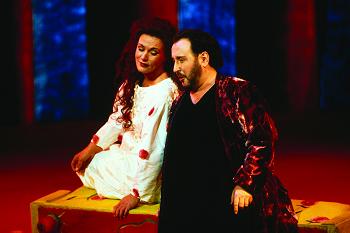|
<< -- 7 -- Ted and Emi Norrish DEVOTION AND HEROISM

To general disappointment, and sympathy, it was announced prior to curtain-up
that Miss Meier was indisposed, but would nevertheless fulfil her part.
In fact, she sang sturdily enough; but her Leonora failed to hold our sympathy
-- Beethoven's subtle combination of human vulnerability and strength, essential
to the character, was largely missing. With the notable exception of Diana
Damrau, whose Marzelline was beautifully alive, the rest of the cast, too,
seemed at times static and uninvolved, and so unsympathetic. Matti Salminen,
another great Wagnerian, made a dull Rocco, who did not seem to convey to
the full the combination of kindness (as a father), efficiency and pride
in his work (as a jailer), but weakness (as a man). In his loose coat and
floppy hat, he looked tired.

Waltraud Meier as Leonora in the Bavarian State Opera's production of Beethoven's 'Fidelio'. Photo: Wilfried Hösl/BSO
|
The characterisation, which is so much a part of this great opera, was
from the start clouded by a production which seemed strangely out of focus.
The dungeon scene in Act 2 should of course be in a dark and gloomy setting,
but it is not clear why the First Act should be dimly lit and even obscure.
At no stage until the final scene of triumph at the end of Act 2 was it
possible (even from a good seat in the stalls) to distinguish any facial
expressions, or even details of a costume. It is surely difficult for a
character, whose expression cannot be seen, to hold our sympathy.

Waltraud Meier as Isolde with Jon Fredric West as Tristan at the Bavarian State Opera. Photo: Wilfried Hösl/BSO
|
Other elements of the production seemed even perverse. It is admittedly
not essential in the first scene for Marzelline to be seen with iron in
hand, but the setting clearly should be in some way domestic -- not merely,
as here, a space in front of two tall columns and a wall. The only 'props'
in the scene consisted of Jaquino's 'parcels' -- huge trunks moved with great
difficulty (the poor boy would be exhausted by collecting these at five
minute intervals). In fact Reiner Trost's Jaquino was far from the naive
and eager boy suggested by the libretto. His long, straggly hair and apparent
balding made him look fifty, and ugly too. It was no wonder that Marzelline
was tired of him : the surprising thing was that she could ever have fancied
him!
Continue >>
Copyright © 8 November 2002
Ted and Emi Norrish, Coventry, UK

|

